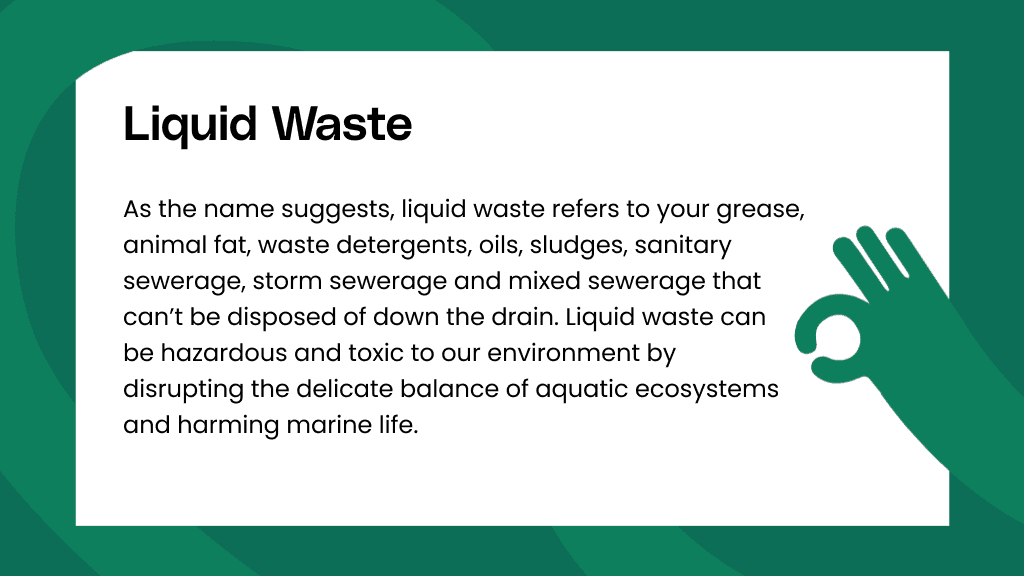Reclaim Waste - Questions
Reclaim Waste - Questions
Blog Article
Facts About Reclaim Waste Uncovered
Table of ContentsIndicators on Reclaim Waste You Should KnowFacts About Reclaim Waste Revealed4 Simple Techniques For Reclaim WasteThe Reclaim Waste PDFsSome Known Details About Reclaim Waste
Domestic sewage waste refers to the waste and products from a household septic tank. The correct administration and disposal of domestic sewage waste call for liquid waste to be moved to a sewer treatment plant where the appropriate approaches and equipment are applied to cleanse and dispose of waste.
Business waste typically includes possible hazards, such as flammable products or a mix of fluid and strong waste items, and requires a much more sophisticated and detailed disposal process. The disposal of industrial waste commonly involves the filtering of waste prior to transport to guarantee risk-free and correct disposal. Industrial waste is produced from results and drainage of industrial procedures and manufacturing.
This type of waste can not utilize the very same sewer management transportation or processes as septic or commercial liquids. The hazardous waste administration process requires the evaluation and testing of fluid waste before it goes through the disposal process (industrial wastewater treatment). Runoff waste is the liquid waste that comes from drainage and excess stormwater in extremely booming areas or cities
Overflow waste can cause contamination and flooding if not managed appropriately. Find out more concerning sewage system cleansing and waste management. Guaranteeing appropriate waste management can prevent disasters and reduce environmental damage. Both individuals in domestic setups and specialists in industrial or production industries can take advantage of recognizing the processes and laws of liquid waste monitoring.
Indicators on Reclaim Waste You Need To Know
Contact PROS Providers today to learn regarding our waste administration and disposal solutions and the correct ways to look after the liquid waste you produce.
(https://ameblo.jp/reclaimwaste1/entry-12874802223.html)This supposed 'wastewater' is not only a vital resource but, after treatment, will certainly be released to our land, rivers or the ocean. Utilized water from bathrooms, showers, baths, cooking area sinks, laundries and industrial procedures is recognized as wastewater.

water made use of to cool down machinery or clean plant and tools). Stormwater, a kind of wastewater, is overflow that moves from agricultural and metropolitan areas such as roof coverings, parks, gardens, roadways, courses and rain gutters right into stormwater drains, after rainfall. Stormwater flows unattended directly to local creeks or rivers, eventually getting to the sea.
The 9-Minute Rule for Reclaim Waste
In Queensland, most wastewater is treated at sewage therapy plants. Wastewater is transferred from domestic or industrial sites through a system of sewers and pump terminals, called sewage reticulation, to a sewer therapy plant. City governments build, preserve and operate most sewage treatment plants. Operators are accredited under the Environmental Security Act 1994 to release cured wastewater at an appropriate ecological criterion into waterways.
The Division of Natural Resources recommends neighborhood federal governments concerning handling, operating and maintaining sewerage systems and treatment plants. In unsewered locations, neighborhood federal governments might call for homeowners to install individual or home sewage therapy systems to deal with residential wastewater from bathrooms, kitchen areas, restrooms and washings. The Department of Natural Resources authorizes making use of family systems when they are verified to be effective.
In some brand-new communities, therapy of some stormwater to remove clutter, sand and gravel has begun using gross pollutant traps. Wastewater treatment takes place in 4 stages: Gets rid of strong issue.
Wastewater then streams right into large storage tanks where solids work out and are gotten rid of as sludge. Grease and scum are skimmed from the surface area. Utilizes little living organisms called micro-organisms to damage down and remove staying liquified wastes and great bits. Micro-organisms and wastes are included in the sludge. Removes nitrogen and phosphorus nutrients that can trigger algal blossoms in our rivers and endanger marine life.
Things about Reclaim Waste
Nutrient removal is not readily available at all sewage treatment plants due to the fact that it requires expensive specialised tools. Clear fluid effluent created after therapy might still consist of disease-causing micro-organisms - liquid waste removal.

This typically implies wastewater has actually to be treated or contaminants gotten rid of before it can be discharged to rivers. Many wastewater streams into the sewage system. Under the Act, city governments provide approvals and permits for eco relevant tasks (Ages) involving wastewater launches that may webpage have a regional effect. The division provides approvals and licences to Ages involving wastewater launches that might have a regional or statewide influence.
The 30-Second Trick For Reclaim Waste
Or else, samples are considered research laboratory analysis. Typically lots of tests are needed to develop the levels of each of the different toxins such as oils, hefty metals and chemicals in water. Monitoring offers accurate details regarding water high quality and can verify that permit conditions are being satisfied. The info gotten via surveillance gives the basis for making water quality choices.
Report this page